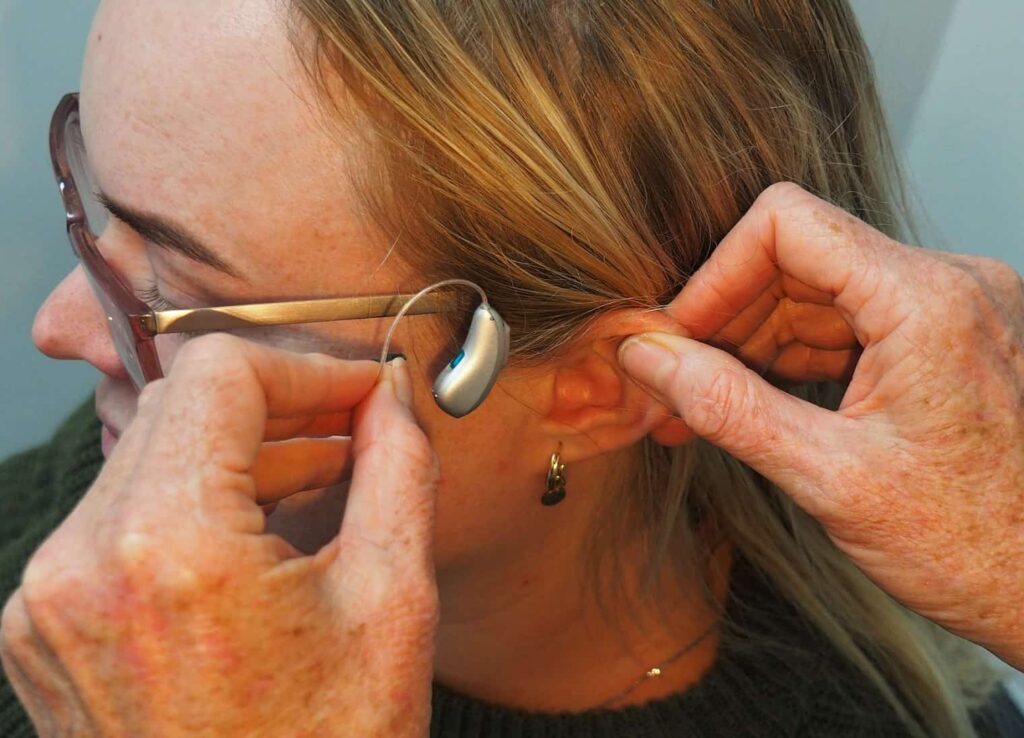Dementia Safeguard: Using Hearing Aids May Help Reduce the Risk of Dementia, Says a Recent Study
Admin
- 0

New research has revealed some promising news for older adults at higher risk of dementia. According to a study published in the Lancet, using hearing aids may help protect against cognitive decline. The study showed that the use of hearing aids can reduce the risk of cognitive decline by a significant 48% for those with additional risk factors for dementia, such as elevated blood pressure, diabetes, lower education, income, and living alone.
Contents
ToggleAlso Read: FDA Grants Full Approval to Revolutionary Anti-Amyloid Drug for Effective Alzheimer’s Treatment
The study involved almost 1,000 older adults aged between 70 and 84, and it lasted for three years. Participants were split into two groups: those with a higher risk of dementia and healthier individuals. When both groups were combined, the use of hearing aids didn’t show a significant impact on slowing cognitive changes. However, when researchers focused on the group at higher risk of dementia, the results were more promising. Hearing intervention, which included counseling with an audiologist and using hearing aids, had a significant effect on reducing cognitive decline in this group. These participants were generally older and had lower cognitive scores, among other factors.
The link between hearing loss and dementia has been previously identified, with age-related hearing loss almost doubling the risk of dementia. It’s estimated that hearing loss contributes to over 8% of new dementia cases each year. However, hearing loss is often left untreated, especially in lower- and middle-income countries. The World Health Organization predicts that by 2050, about 2.5 billion people will have some degree of hearing loss, and at least 700 million people will require assistance with their hearing.
The lead author of the study, Frank Lin from Johns Hopkins University, expressed his surprise at the study’s findings, highlighting the importance of addressing hearing problems for cognitive health. He emphasized the need for people to get their hearing checked regularly, as many may not even realize they have hearing loss.
Also Read: Anxiety Problem Causes and its Treatment at Home
Although this study offers positive data, it is still unclear if hearing therapy can completely prevent dementia over time. However, this ground-breaking study highlights the potential advantages of hearing aids for enhancing brain health for senior citizens who are more at risk for dementia. It highlights the need of maintaining good hearing in order to preserve our mental abilities as we age.
FAQs
What is Dementia?
Ans. Dementia is a condition that affects the brain and makes it difficult for people to remember things, think clearly, and behave like they used to. It’s caused by diseases like Alzheimer’s. People with dementia may have trouble remembering things, solving problems, and communicating.
What are the 10 warning signs of dementia?
Ans. The 10 warning signs of dementia are:
1. Memory loss that disturbs daily life.
2. Difficulty in planning or solving problems.
3. Struggling to complete familiar tasks.
4. Confusion with time or place.
5. Trouble understanding visual images and spatial relationships.
6. New problems with speaking or writing.
7. Misplacing things and unable to retrace steps.
8. Poor judgment and decision-making.
9. Withdrawal from social activities.
10. Changes in mood or personality.
Can dementia be cured?
Ans. As of now, dementia cannot be cured completely. There is no treatment to reverse its underlying causes, such as Alzheimer’s disease. However, some medications and therapies can help manage symptoms and slow down their progression, improving the person’s quality of life. Early diagnosis and proper care are essential.
Who are at risk for dementia?
Ans. People at risk for dementia are typically older adults, especially those over 65. Other risk factors include family history of dementia, certain genetic factors, cardiovascular diseases, high blood pressure, diabetes, and a sedentary lifestyle. Leading a healthy lifestyle with regular exercise and a balanced diet can help reduce the risk.


